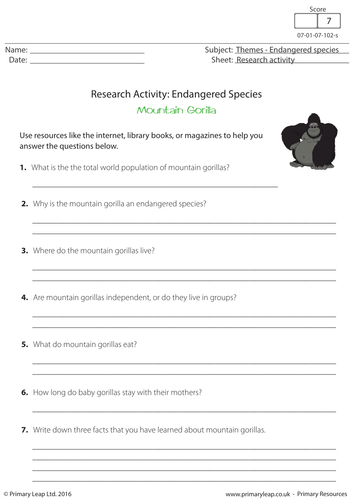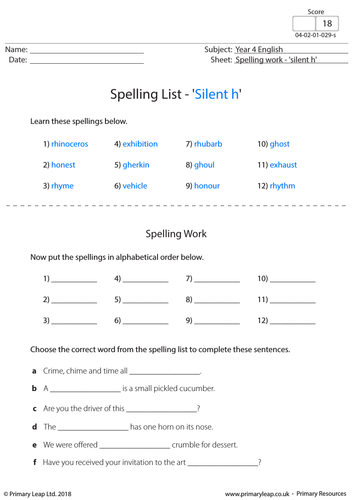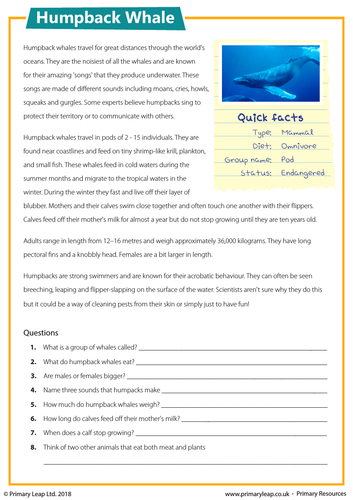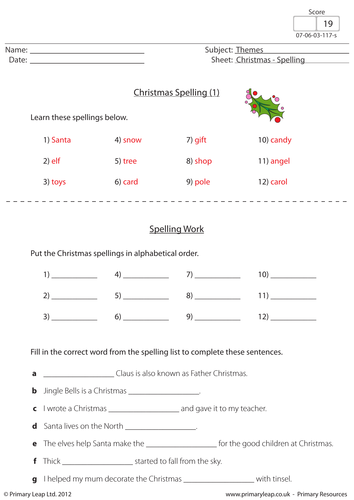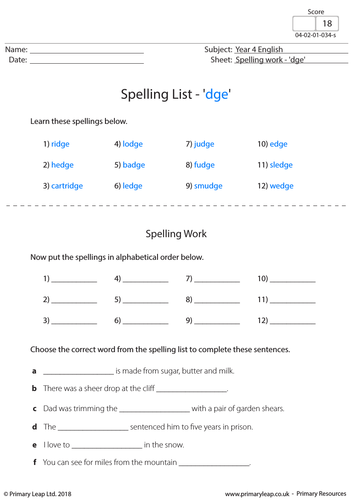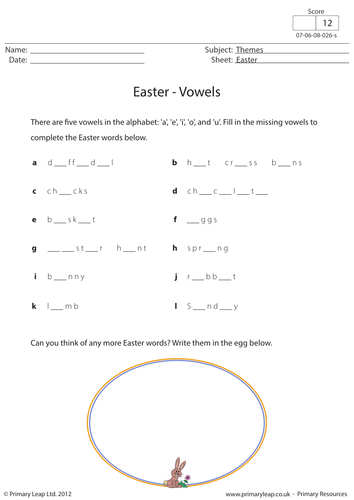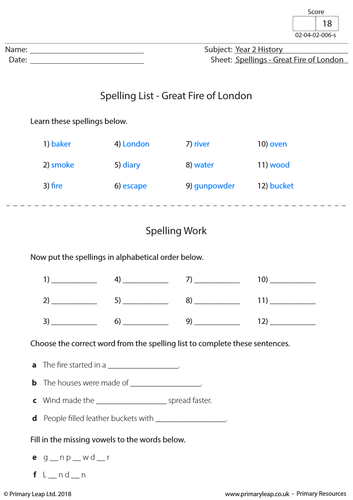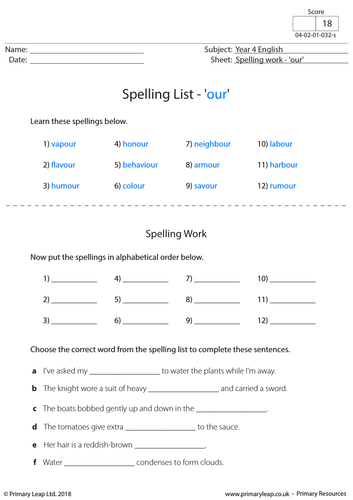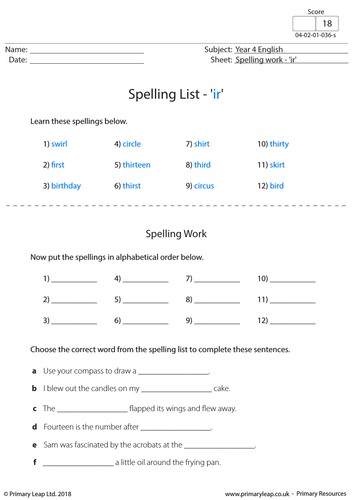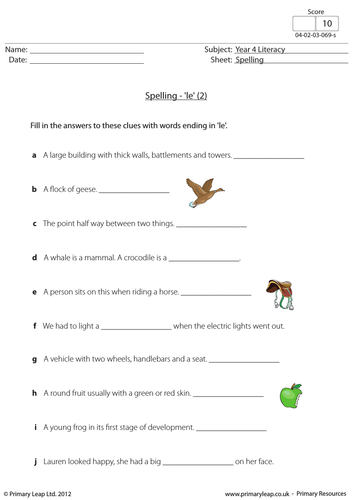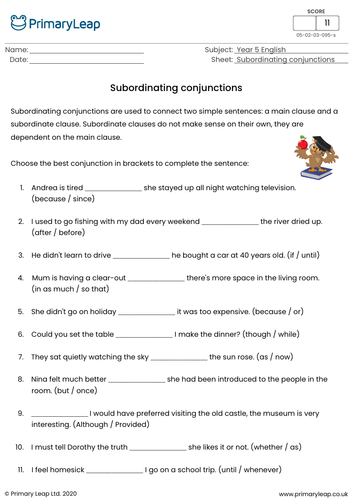560Uploads
453k+Views
210k+Downloads
English language arts

Research Activity - Mountain Gorillas
Students are asked to use resources like the internet, library books, or magazines to help them answer the questions about mountain gorillas. This worksheet was created by primaryleap.co.uk

KS2 English Resource - Spellings 'silent h'
A year 4 English resource including a list of 12 words with silent ‘h’ for students to learn.
This worksheet was created by Primary Leap

KS2 Reading Comprehension - Humpback Whale
This year 5 English worksheet includes a short passage with facts about humpback whales and questions to follow.
This worksheet was created by Primary Leap

Christmas Spellings Worksheet 1
This worksheet was created by primaryleap.co.uk
This Christmas worksheet includes 12 spellings for children to learn. Children must also put the spellings in alphabetical order and fill in the missing words to complete the sentences.

KS2 Spellings - 'dge'
A KS2 English resource including a list of 12 words with ‘dge’ for students to learn. There are exercises including putting the words in alphabetical order and choosing the correct word from the spelling list to complete the sentences.
This resource was created by Primary Leap

English Resource - Missing Vowels: Easter
This English worksheet will help children learn their vowels. The words are associated with Easter and can be used as a fun Easter resource! This worksheet was created by primaryleap.co.uk

Reading comprehension - Aardvark
This reading comprehension includes some interesting facts about the aardvark. This resource was created for children of 8 - 9 years old. Pupils are asked to read the informational text and then answer the accompanying study questions. There are 8 questions to answer. Aligned to Common Core State Standard: RI.3.1

KS2 English Resource - Adding 'ing'
This KS2 English worksheet focuses on adding ‘ing’ to words. Students read the words and write them correctly in the boxes provided.
This worksheet was created by Primary Leap

KS2 English Resource - Apostrophes
A primary English resource on writing sentences and adding the missing apostrophes.
This worksheet was created by Primary Leap

Spelling list - Great Fire of London
This year 2 literacy worksheet includes a list of spellings associated with the Great Fire of London.
This worksheet was created by Primary Leap

English Resource - Unscramble the Sentences 1
This multi-step worksheet will help children practice their sentence building. Students unscramble the words to write a statement. They then use the same words to write a question. This worksheet was created by primaryleap.co.uk

KS2 English Worksheet - Spellings 'our'
A KS2 English resource including a list of 12 words with ‘our’ for students to learn.
This worksheet was created by Primary Leap

KS2 English Worksheet - Spellings 'ir'
A KS2 English resource including a list of 12 words with ‘ir’ for students to learn. There are exercises including putting the words in alphabetical order and choosing the correct word from the spelling list to complete the sentences.
This resource was created by Primary Leap

KS2 English Resource: Spelling - 'le'
This year 4 spelling worksheet focuses on words ending in ‘le’. Children must read the clues and fill in the missing ‘le’ words.
This worksheet was created by Primary Leap

KS2 English - Coordinating conjunctions
Coordinating conjunctions are used to connect sentences, words and phrases. They act as a kind of glue, linking the text together to help the sentences flow smoothly. This English resource asks students to choose the best conjunction in brackets to complete the sentences.
Worksheet created by Primary Leap

Circle the Contractions - English Resource
A contraction is a word made by shortening and combining two words. Words like can’t (can + not) and don’t (do + not) are contractions. Students read each sentence and circle the contraction in each sentence.

Active or passive?
An active voice is when the subject of the sentence is performing the act. A passive voice is when the subject of the sentence is having something done to it by somebody else. Often the word ‘by’ is used, but not always. This English worksheet asks students to write ‘active’ or ‘passive’ after each sentence.
This worksheet was created by Lauren Savage

Verb prefixes - dis and mis
A prefix is a group of letters added before a word to alter its meaning. The prefix ‘dis’ is generally used to make a word negative. The prefix ‘mis’ means badly, wrongly or incorrectly. This English resource asks students to choose the correct word to complete the sentence.
This worksheet was created by Lauren Savage

Relative clauses
Relative clauses are used to connect sentences. We use relative clauses to give additional information about something without starting a new sentence. The most common relative pronouns are: who, whom, whose, which and that. This English resource asks students to choose the best relative pronoun to complete the sentences.
This worksheet was created by Lauren Savage

KS2 English - Subordinating conjunctions
Subordinating conjunctions are used to connect two simple sentences: a main clause and a subordinate clause. Subordinate clauses do not make sense on their own, they are dependent on the main clause. This English activity asks students to choose the best conjunction in brackets to complete the sentences.
Resource created by Lauren Savage

